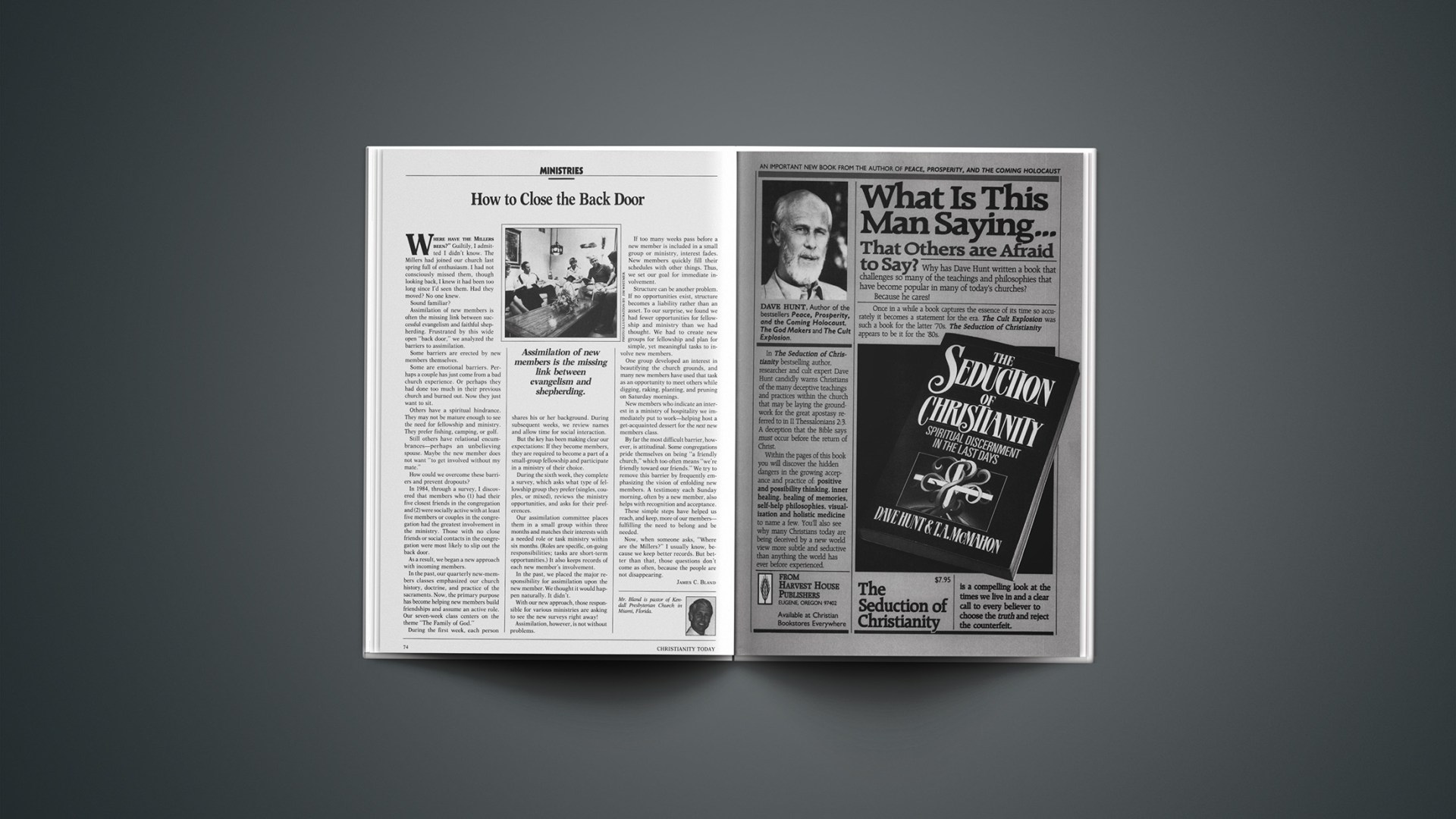Where have the Millers been?” Guiltily, I admitted I didn’t know. The Millers had joined our church last spring full of enthusiasm. I had not consciously missed them, though looking back, I knew it had been too long since I’d seen them. Had they moved? No one knew.
Sound familiar?
Assimilation of new members is often the missing link between successful evangelism and faithful shepherding. Frustrated by this wide open “back door,” we analyzed the barriers to assimilation.
Some barriers are erected by new members themselves.
Some are emotional barriers. Perhaps a couple has just come from a bad church experience. Or perhaps they had done too much in their previous church and burned out. Now they just want to sit.
Others have a spiritual hindrance. They may not be mature enough to see the need for fellowship and ministry. They prefer fishing, camping, or golf.
Still others have relational encumbrances—perhaps an unbelieving spouse. Maybe the new member does not want “to get involved without my mate.”
How could we overcome these barriers and prevent dropouts?
In 1984, through a survey, I discovered that members who (1) had their five closest friends in the congregation and (2) were socially active with at least five members or couples in the congregation had the greatest involvement in the ministry. Those with no close friends or social contacts in the congregation were most likely to slip out the back door.
As a result, we began a new approach with incoming members.
In the past, our quarterly new-members classes emphasized our church history, doctrine, and practice of the sacraments. Now, the primary purpose has become helping new members build friendships and assume an active role. Our seven-week class centers on the theme “The Family of God.”
During the first week, each person shares his or her background. During subsequent weeks, we review names and allow time for social interaction.
But the key has been making clear our expectations: If they become members, they are required to become a part of a small-group fellowship and participate in a ministry of their choice.
During the sixth week, they complete a survey, which asks what type of fellowship group they prefer (singles, couples, or mixed), reviews the ministry opportunities, and asks for their preferences.
Our assimilation committee places them in a small group within three months and matches their interests with a needed role or task ministry within six months. (Roles are specific, on-going responsibilities; tasks are short-term opportunities.) It also keeps records of each new member’s involvement.
In the past, we placed the major responsibility for assimilation upon the new member. We thought it would happen naturally. It didn’t.
With our new approach, those responsible for various ministries are asking to see the new surveys right away!
Assimilation, however, is not without problems.
If too many weeks pass before a new member is included in a small group or ministry, interest fades. New members quickly fill their schedules with other things. Thus, we set our goal for immediate involvement.
Structure can be another problem. If no opportunities exist, structure becomes a liability rather than an asset. To our surprise, we found we had fewer opportunities for fellowship and ministry than we had thought. We had to create new groups for fellowship and plan for simple, yet meaningful tasks to involve new members.
One group developed an interest in beautifying the church grounds, and many new members have used that task as an opportunity to meet others while digging, raking, planting, and pruning on Saturday mornings.
New members who indicate an interest in a ministry of hospitality we immediately put to work—helping host a get-acquainted dessert for the next new members class.
By far the most difficult barrier, however, is attitudinal. Some congregations pride themselves on being “a friendly church,” which too often means “we’re friendly toward our friends.” We try to remove this barrier by frequently emphasizing the vision of enfolding new members. A testimony each Sunday morning, often by a new member, also helps with recognition and acceptance.
These simple steps have helped us reach, and keep, more of our members—fulfilling the need to belong and be needed.
Now, when someone asks, “Where are the Millers?” I usually know, because we keep better records. But better than that, those questions don’t come as often, because the people are not disappearing.
JAMES C. BLAND1Mr. Bland is pastor of Kendall Presbyterian Church in Miami, Florida.










